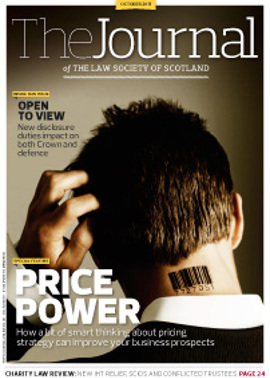Opinion
The McCluskey Review proposes that a system of certification be put in place such that the High Court, by certificate, determine the questions to be posed to the UK Supreme Court in criminal appeals raising human rights issues. (The Supreme Court should have the power to grant or refuse leave, subject to the caveat that the Court should have no power to consider granting leave unless a certificate has been granted at the High Court.)
The certification process, per the McCluskey report, simply follows existing situations within the Scottish jurisdiction in allowing a decision-making court the power to grant or refuse leave to appeal a decision.
The McCluskey report, whilst recognising the argument, does not accept there is a danger that certification could lead to a denial of access to justice. However, the certificate that is proposed is stated as requiring that the issue in question is of “general public importance”.
It is respectfully submitted that this is where the McCluskey report fails. A question of “general public importance” is of course a significant issue of concern, both for the executive and for the courts. It impacts upon major aspects of law and life. It also omits (by its very nature) what should be the paramount consideration in such matters, namely that there should be a test of the individual circumstances.
The “general public importance” test is surely a three-part one, comprising “general”, i.e. not specific; “public”, i.e. not private; and “importance”, i.e. not trivial.
The European Convention on Human Rights, which gives rise to the devolution minute procedure and the ability of individuals to enforce their human rights, cannot be slotted in crudely to such a definition as is proposed. A common thread in judgments is that cases are generally determined on their own particular circumstances. There can be no more particular circumstance than in the situation of individuality.
If there is a requirement for such a certificate, it is almost an inevitability that there will follow scenarios where individuals will be restrained from taking an appeal because the High Court determines that their individual situation (even if meritorious and statable) does not meet the test being set for certification.
The requirement for such a certificate is then a clear barrier to and a restriction on an individual’s ECHR rights, and to ongoing access to justice.
It has to be recognised, of course, that discretionary matters in court decisions and sifting procedures have been in place for some time. Generally, there is no objection to such systems. Where this becomes objectionable is in the twinned proposals.
Alongside the “certification” scheme, the recommendation is made in para 43 of Lord McCluskey’s report, “but that the Supreme Court should have no power to consider granting leave unless a certificate has been granted by the High Court”.
If Scotland is serious about the ECHR having a place in our law, and about allowing and empowering individuals to seek access to justice, then the very suggestion that the most Supreme Court in the land, trusted and tasked with determining such relevant issues, should in some way be fettered in its powers and deemed, effectively, unable properly to consider whether a matter raised is something the court should hear, is both illogical and abhorrent.
Certification may have its place. The test of certification proposed currently is inappropriate. Prohibition on the ability of the Supreme Court to, itself, grant leave to appeal would be a step in the wrong direction. Access to justice for individuals should not be restrained in the manner proposed.
In this issue
- Frank Maguire: an appreciation
- The Society's new corporate plan
- Budgeting for 2011-12
- Shooting the carrier
- Future of adventure activities licensing
- A year in mortgage recoveries, and oh what a year!
- A clearer lending code
- Land of myths and (occasional) legends?
- Crofting briefing
- Reading for pleasure
- Opinion
- Book reviews
- Council profile
- President's column
- Foreign and different
- The price is right
- Into his stride
- Do not cross
- All aboard the Land Register
- As easy as 10%?
- Definition under strain
- Another round
- Honest and reasonable?
- Demolition derby 2
- From the other side
- In-house Lawyers Group under review
- Necessary formalities
- Practical limitations
- Remember, remember... the first of November
- "Storm not over yet", Cunningham tells conference
- Constitution: new proposals for AGM
- From the Brussels office
- Screen test
- Ask Ash
- SYLA appeals for advisers
- Full schedule






